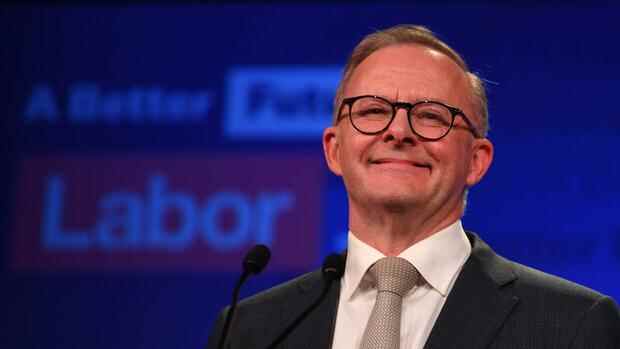Albanese and his party are replacing the previously governing liberal-conservative coalition that had been in office for almost a decade.
(Photo: IMAGO/AAP)
Bangkok In recent years, severe forest fires and devastating floods have made Australia aware of the impact of climate change. The winner of the Australian general election, Anthony Albanese, is now promising a fresh start in climate policy.
In a speech at the weekend, after outgoing Prime Minister Scott Morrison congratulated him on his victory, the leader of the Social Democratic Labor Party promised that he wants to turn his country into a “superpower of renewable energies”.
Albanese and his party are replacing the previously governing liberal-conservative coalition that had been in office for almost a decade. According to the latest projection, Labor is clearly the strongest with more than 70 seats. 76 seats are needed for an absolute majority. Albanese may therefore need support from Green MPs or a non-party group.
Candidates from the “Blue-Green Independents” (“Teal Independents”) movement had succeeded in winning MPs in several usually conservative constituencies with the call for a more ambitious climate policy.
Top jobs of the day
Find the best jobs now and
be notified by email.
The founder of the Climate 200 activist group, Simon Holmes à Court, saw the result as a strong signal: The election had shown that a considerable proportion of Australians were fed up with “nine years of failure in climate policy”. Climate 200 had raised the equivalent of around eight million euros from donors in order to support the election campaigns of climate-friendly candidates.
Albanese wants to sharpen climate targets
Australia is one of the largest coal exporters in the world and – despite a large potential in renewable energy – obtains the majority of its own needs from fossil fuels. In an international comparison, the country is one of the biggest climate sinners: only a few countries have higher per capita emissions of carbon dioxide than Australia. According to World Bank data, the value was 15.5 tons per year – 80 percent higher than in Germany.
Australia is one of the largest coal exporters in the world.
(Photo: Bloomberg)
Activists believe that the climate targets previously promised by the government are not ambitious enough. According to current plans, Australia aims to reduce its emissions by up to 28 percent below 2005 levels by 2030. For comparison: The European Union and the USA want to more than halve their emissions of greenhouse gases in the same period.
During the election campaign, the Albanian Labor Party promised to sharpen the climate commitments and now wants to achieve a reduction of 43 percent by 2030. Among other things, Labor plans to invest the equivalent of around 13 billion euros in the electricity infrastructure in order to enable a significant expansion of renewable energies.
Albanese also wants to stick to coal mining as a key industry. If companies are looking to invest further in the space, Labor would welcome the jobs that will be created, Albanese said.
Morrison of the right-wing conservative coalition is replaced by Albanese as prime minister.
(Photo: Getty Images)
In addition to climate policy, Albanese made social issues the focus of his campaign. He complains about the sharp rise in the cost of living and a drop in real wages as a result of the high inflation rate. At 5.1 percent, it was the highest level in Australia for more than two decades.
Albanese called for inflation compensation for all minimum wage earners, who currently receive the equivalent of 13.50 euros per hour. He also emphasized his own humble origins – and reiterated this in his victory speech: “It says a lot about our great country that a son of a single mother raised in council housing can stand before you as Australia’s Prime Minister today.”
Meeting with Joe Biden on Tuesday
Albanian is a graduate economist and the first member of his family with a university degree. The 59-year-old has been a member of Australia’s parliament for more than a quarter of a century. He was Secretary of State for Infrastructure and Transport under Labor Prime Ministers Kevin Rudd and Julia Gillard.
Last year he suffered serious injuries in a car accident and, according to his own statements, barely survived. Albanese described the incident as a trigger for his attempt to live a healthier life – he has since lost 18 kilos. He also changed his public appearance in other ways: he bought tailored suits and modern glasses. His opponent Morrison accused him of pretending to be a different person.
Albanese does not have much time to change roles from opposition leader to head of government. The Labor chief expects to be sworn in as the new prime minister as early as Monday.
He then wants to attend a summit meeting with US President Joe Biden, Japan’s Prime Minister Fumio Kishida and India’s Prime Minister Narendra Modi in Tokyo on Tuesday. At the meeting of the so-called Quad Group, he wanted to make it clear on the international stage that Australia’s policy would change, Albanese said, “especially with regard to climate change”.
Australia’s position in relation to China under the new prime minister is also being closely observed. Relations between the two countries had deteriorated sharply under Morrison. In the substance of the China policy, Labor hardly differs from the previous government, commented Patrick Köllner, director of the Hamburg Giga Institute for Asian Studies. “But the tone could be different.” The change of government basically offers the potential for an improvement in bilateral relations.
More: China phobia in the election campaign – Australia’s conservatives warn of a war
